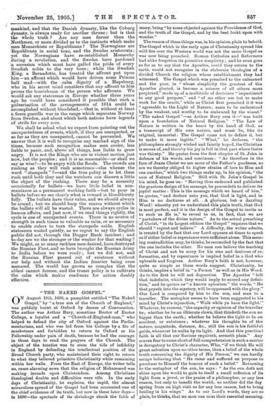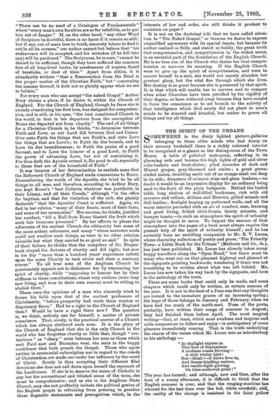"There can be no need of a Catalogue of Fundamentals"
where " every man's own faculties are so far infallible, as to put him but of danger." If, on the other hand, "any other Word of Scripture be doubtful, there is no harm if it remain so still ; but if any, out of mere love to truth, sincerely labour to find it out in all its corners," our author cannot but believe that "his endeavours will be accepted, and his mistakes (if be fall into any) will be pardoned." The Scriptures, he is sure, "cannot be denied to be sufficient, though they have suffered the common
lute of all long-lived books, by carelessness of copiers, fraud of hereticks, or dust of time." Apart from ethics, it is
abundantly evident "that a Resurrection from the Dead is the proper matter of the Christian Faith," but "concerning the manner thereof, it doth not so plainly appear what we are to believe."
For every man who can accept "the naked Gospel" Arthur Bury claims a place, if he desire it, within the Church of England. For the Church of England, though he fears she is
already abandoning her first love, was designed for comprehen- sion, and is still, in his eyes, "the best constituted Church in
the world, in that in her departure from the corruption of Rome she departed not from charity." The end of all things for a Christian Church is, he thinks, "to determine between Faith and Love, as our Lord did between God and Caesar.
Give unto Faith the things that are Faith's, and unto Love the things that are Love's ; to Faith its due bounds, and to Love its due boundlessness; to Faith the praise of a good Servant, and to Love the honour of a good Lord ; to Faith the power of advancing Love, but not of restraining it.
For thus doth the Apostle extend it, Do good to all, especially to those that are of the household of Faith."
- It was because of her determination to exclude none that the Reformed Church of England made concessions to Rome. Remembering the words of the Apostle, she tried to be all things to all men, and therefore, according to Arthur Bury, she kept Rome's "best Collects, whatever was justifiable in their Litany, and all their Creeds," although "in the office for baptism, and that for visitation of the sick, she 'plainly declareth" that the Apostles' Creed is sufficient. Again, we find in her rubrics "many of their feasts, most of their fasts, and some of her ceremonies." Her success, he thinks, justified her conduct, "till a Bull from Rome blasted the fruit which such fair blossoms promised." By her efforts to please the adherents of the ancient Church she ultimately lost some of the more ardent reformers, and many "whose narrower souls could not swallow such things, as were in no other relation Valuable but what they carried to so good an end." In spite of their failure, he thinks that the compilers of fir:: Prayer- book obeyed the dictates of charity and did right; but now in his day "more than a hundred years' experience calleth upon the same Charity to tack about and steer a contrary course." To all true sons of the Anglican Church he passionately appeals not to dishonour her by renouncing her spirit of charity, while "supposing to honour her by their stiffness to those constitutions, whose very authors (were they now living, and true to their own reason) must be willing to abolish them."
These were the opinions of a man who sincerely tried to frame his faith upon that of the earliest professors of Christianity, "before prosperity had made them wanton or disputancy fierce." Had he a right in the Church of England then? Would he have a right there now ? The question is, we think, entirely one for himself, a matter of private conscience. That, surely, is the practical answer of a Church which has always sheltered such sons. It is the glory of the Church of England that she is the only Church in the world who has forgotten charity so little that, though " con- tentions " as " sharp " exist between her sons as those which sent Paul east and Barnabas west, she rests in the happy confidence that both preach the Gospel. Those who agree neither in ceremonial subscription nor in regard to the creeds of Christendom are made one under her influence by the creed of Christ. Surely in thus accepting their different filial devotions she does not call down upon herself the reproach of the Laodiceans. If she is to deserve the name of Catholic in any but the conventional and vitiated sense of the term, she Must be comprehensive ; and as she is the Anglican State Church, may she not profitably imitate the political genius of the English people in refraining from pressing in practice those dogmatic statements and prerogatives which, in the
interests of law and order, she still thinks it prudent' tla maintain on paper ?
It is not on the doctrinal side that we have calla oaten. Lion to "The Naked Gospel," or because we desire to express unqualified agreement with its special tenets, but because its author realised so fully, and stated so boldly, the great truth that comprehension, and comprehension in the widest sense, is an essential part of the foundation of the English Church. He is no true son of the Church who denies her that compre- hension or narrows its meaning. If the English Church were to give up the spirit of comprehension, and were to narrow herself to a sect, she would not merely abandon her greatest glory, but the vital fire through which she lives. Her destiny is so great because she is possessed by that spirit. It is that which will enable her to survive and to conquer when other Churches have been petrified by the rigidity of their dogma, or have withered away because they have sought to force the conscience or to set bounds to the activity of that intelligence which God surely did not plant in men's minds to be stunted and dwarfed, but rather to prove all things and try all things.
THE SPIRIT OF THE URBANE.
SOMEWHERE in the dimly lighted picture-galleries belonging to those older minds who had Aesop on their nursery bookshelf there is a richly coloured interior to be recognised at a glance as the dining-room of the Town Mouse. A table of polished mahogany, reflecting in its gleaming reds and browns the high lights of gold and silver cake-baskets and fruit-dishes ; piled cascades of dark and Muscat grapes, grey-bloomed and amber ; a great green. rinded melon, tumbling seeds out of an orange slash cut deep in its side ; decanters of crimson wine and glass beakers,—no doubt it would be an impressive display for an ordinary being
used to the fruit of the plain hedgerow. Behind the loaded table, long shelves of well-filled bookcases, rich with old morocco and vellum, Aldines and Elzevin, gilded missals and dull leather ; firelight leaping up patterned walls, and all the warm interior pervaded with an air of comfort, ease, learning and good living, frilled shirt-fronts, dainty minuets, and bumper toasts,—in such an atmosphere the spirit of urbanity





















































 Previous page
Previous page